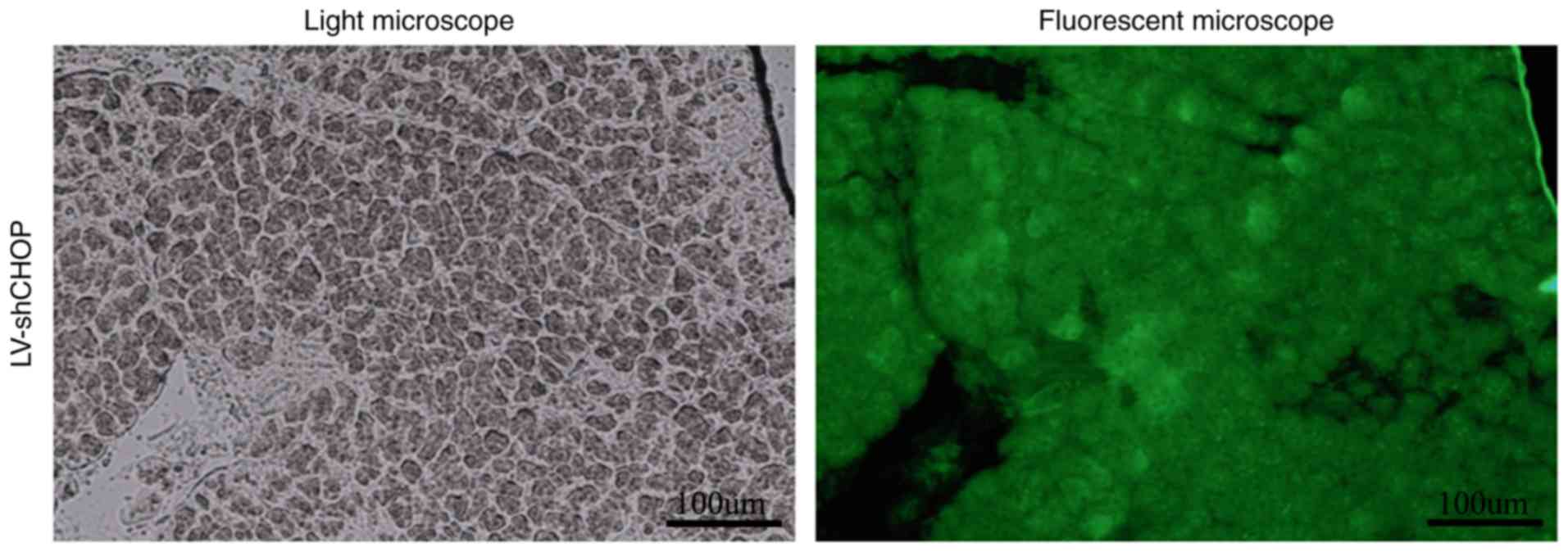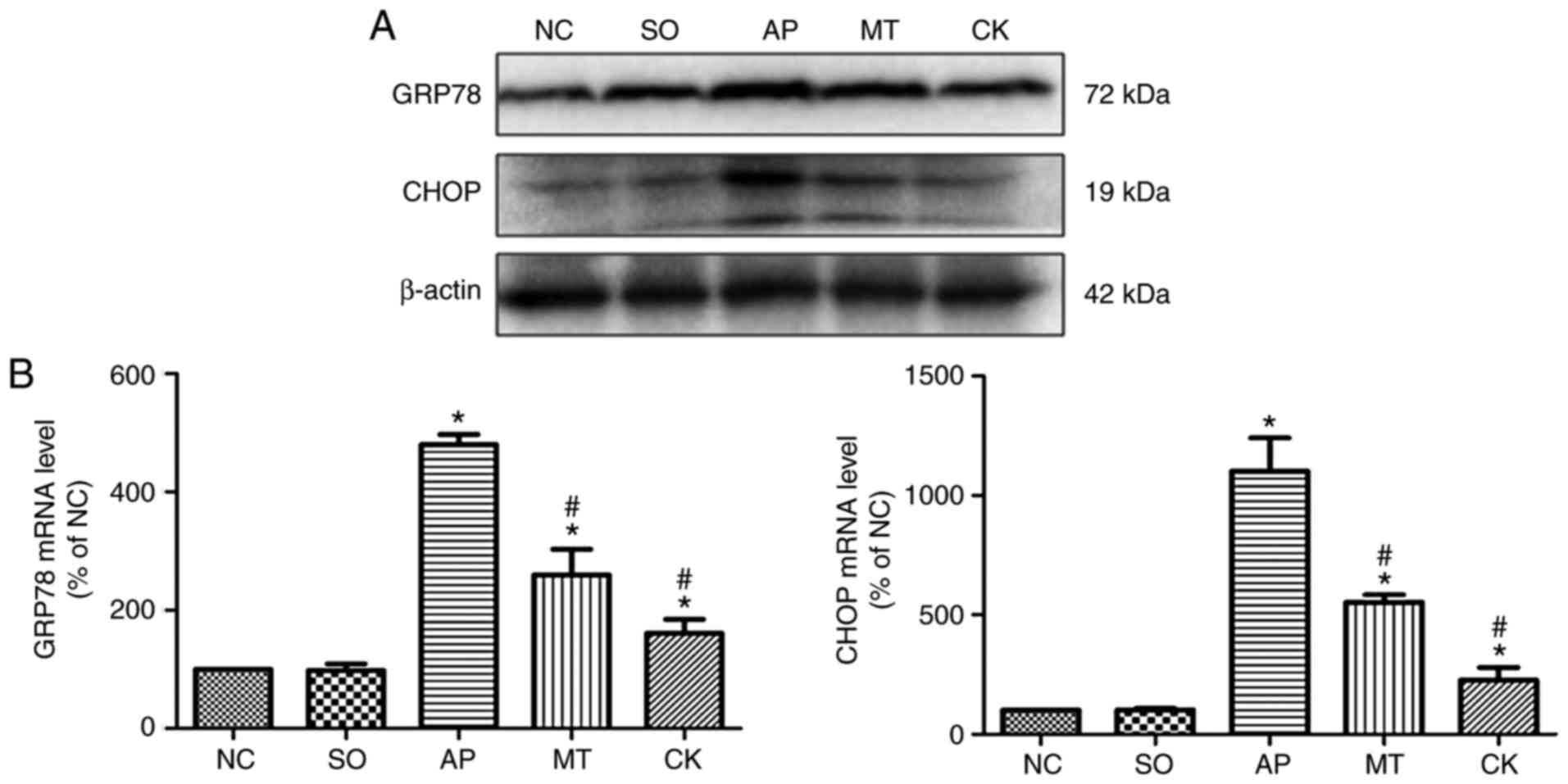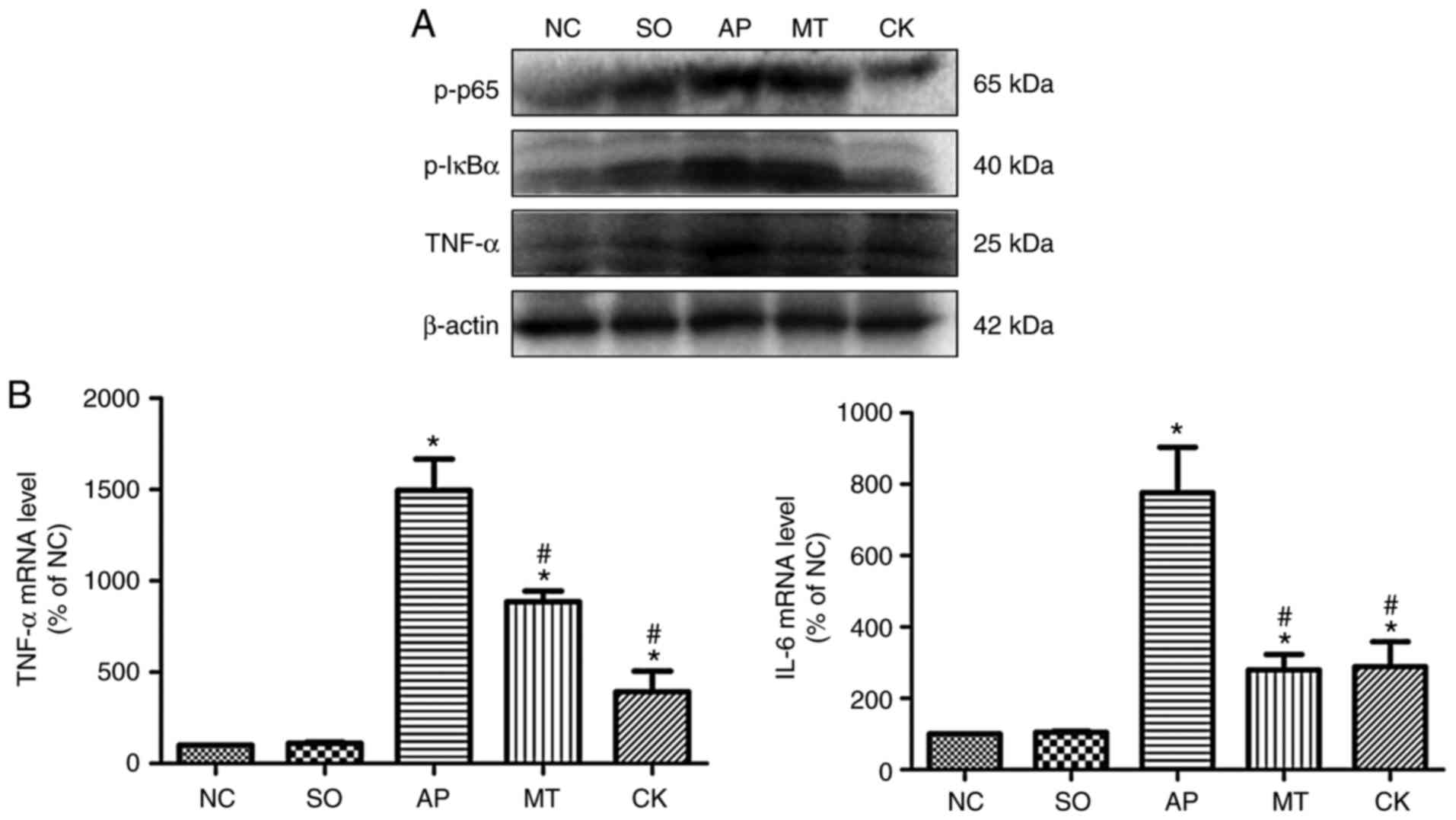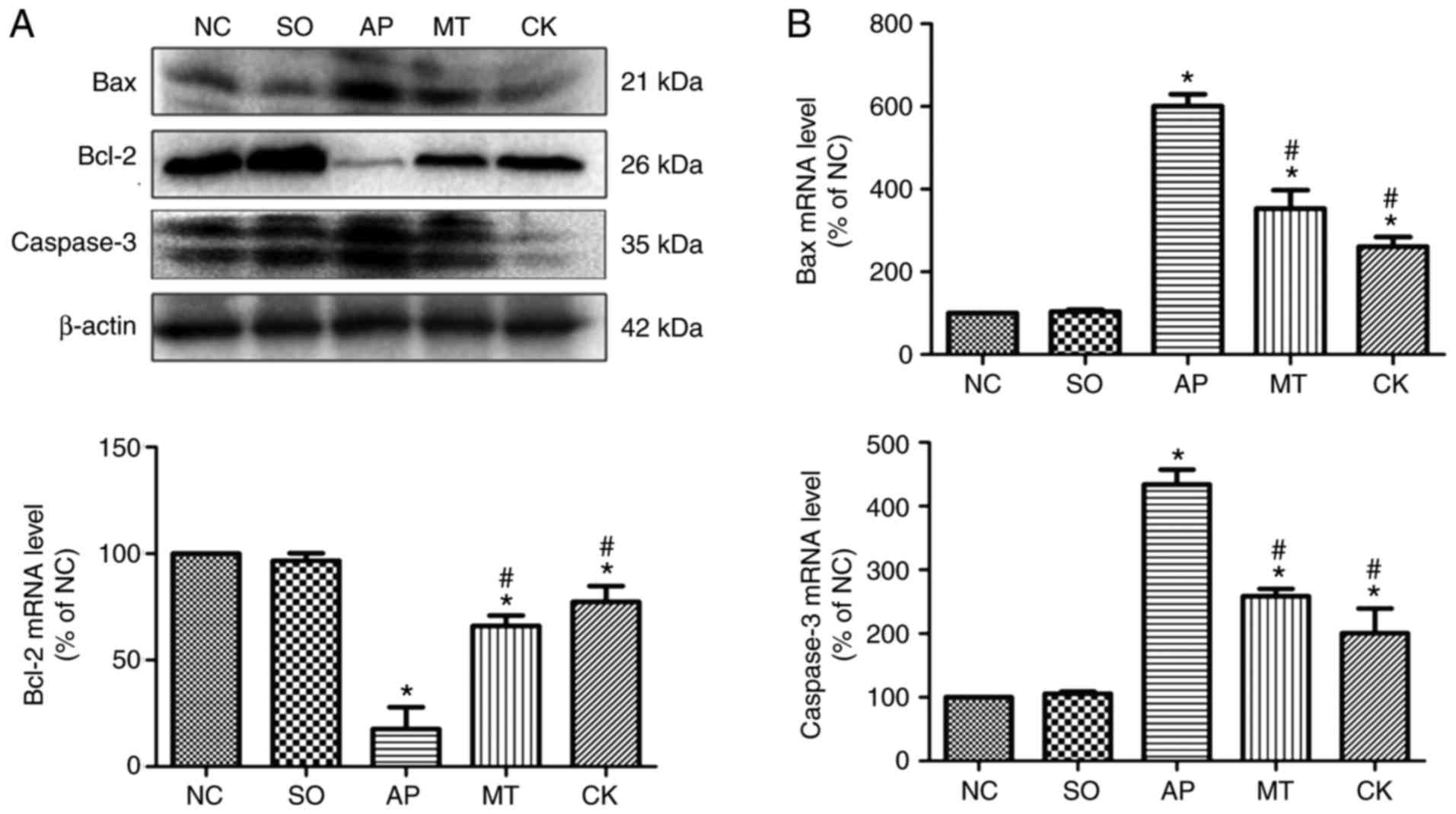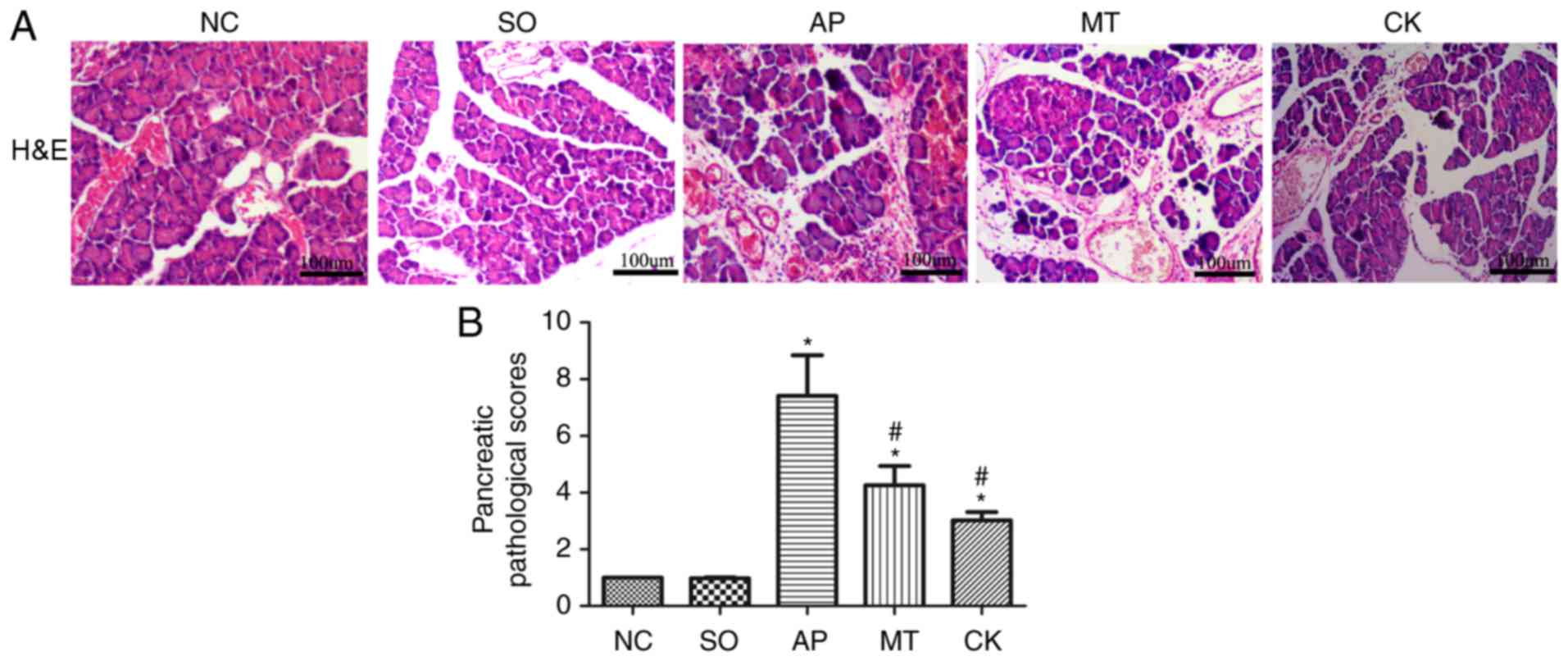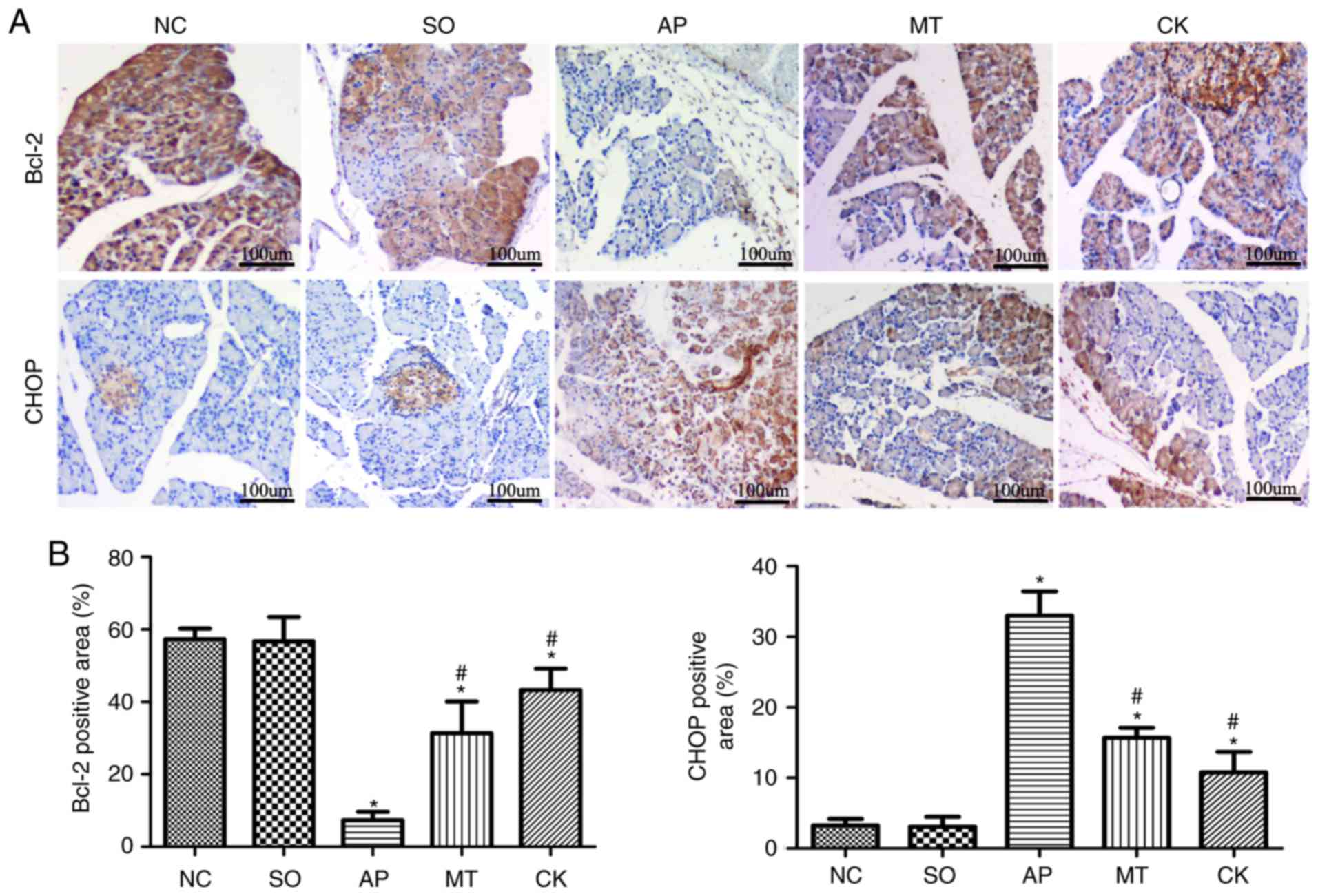|
1
|
Kubisch CH and Logsdon CD: Endoplasmic
reticulum stress and the pancreatic acinar cell. Expert Rev
Gastroenterol Hepatol. 2:249–260. 2008. View Article : Google Scholar : PubMed/NCBI
|
|
2
|
Allagnat F, Fukaya M, Nogueira TC,
Delaroche D, Welsh N, Marselli L, Marchetti P, Haefliger JA,
Eizirik D and Cardozo AK: C/EBP homologous protein contributes to
cytokine-induced pro-inflammatory responses and apoptosis in
β-cells. Cell Death Differ. 19:1836–1846. 2012. View Article : Google Scholar : PubMed/NCBI
|
|
3
|
Miyazaki Y, Kaikita K, Endo M, Horio E,
Miura M, Tsujita K, Hokimoto S, Yamamuro M, Iwawaki T, Gotoh T, et
al: C/EBP homologous protein deficiency attenuates myocardial
reperfusion injury by inhibiting myocardial apoptosis and
inflammation. Arterioscler Thromb Vasc Biol. 31:1124–1132. 2011.
View Article : Google Scholar : PubMed/NCBI
|
|
4
|
Wu JS, Li WM, Chen YN, Zhao Q and Chen QF:
Endoplasmic reticulum stress is activated in acute pancreatitis. J
Dig Dis. 17:295–303. 2016. View Article : Google Scholar : PubMed/NCBI
|
|
5
|
Nashine S, Liu Y, Kim BJ, Clark AF and
Pang IH: Role of C/EBP homologous protein in retinal ganglion cell
death after ischemia/reperfusion injury. Invest Ophthalmol Vis Sci.
56:221–231. 2014. View Article : Google Scholar : PubMed/NCBI
|
|
6
|
Ron D and Walter P: Signal integration in
the endoplasmic reticulum unfolded protein response. Nat Rev Mol
Cell Biol. 8:519–529. 2007. View
Article : Google Scholar : PubMed/NCBI
|
|
7
|
Schröder M and Kaufman RJ: The mammalian
unfolded protein response. Annu Rev Biochem. 74:739–789. 2005.
View Article : Google Scholar : PubMed/NCBI
|
|
8
|
Ohoka N, Yoshii S, Hattori T, Onozaki K
and Hayashi H: TRB3, a novel ER stress-inducible gene, is induced
via ATF4-CHOP pathway and is involved in cell death. EMBO J.
24:1243–1255. 2005. View Article : Google Scholar : PubMed/NCBI
|
|
9
|
Yamaguchi H and Wang HG: CHOP is involved
in endoplasmic reticulum stress-induced apoptosis by enhancing DR5
expression in human carcinoma cells. J Biol Chem. 279:45495–45502.
2004. View Article : Google Scholar : PubMed/NCBI
|
|
10
|
Puthalakath H, O'Reilly LA, Gunn P, Lee L,
Kelly PN, Huntington ND, Hughes PD, Michalak EM, McKimm-Breschkin
J, Motoyama N, et al: ER stress triggers apoptosis by activating
BH3-only protein Bim. Cell. 129:1337–1349. 2007. View Article : Google Scholar : PubMed/NCBI
|
|
11
|
Song B, Scheuner D, Ron D, Pennathur S and
Kaufman RJ: Chop deletion reduces oxidative stress, improves beta
cell function, and promotes cell survival in multiple mouse models
of diabetes. J Clin Invest. 118:3378–3389. 2008. View Article : Google Scholar : PubMed/NCBI
|
|
12
|
Oyadomari S, Koizumi A, Takeda K, Gotoh T,
Akira S, Araki E and Mori M: Targeted disruption of the Chop gene
delays endoplasmic reticulum stressmediated diabetes. J Clin
Invest. 109:525–532. 2002. View Article : Google Scholar : PubMed/NCBI
|
|
13
|
Milhavet O, Martindale JL, Camandola S,
Chan SL, Gary DS, Cheng A, Holbrook NJ and Mattson MP: Involvement
of GADD153 in the pathogenic action of presenilin-1 mutations. J
Neurochem. 83:673–681. 2002. View Article : Google Scholar : PubMed/NCBI
|
|
14
|
Paschen W, Gissel C, Linden T, Althausen S
and Doutheil J: Activation of GADD153 expression through transient
cerebral ischemia: Evidence that ischemia causes endoplasmic
reticulum dysfunction. Brain Res Mol Brain Res. 60:115–122. 1998.
View Article : Google Scholar : PubMed/NCBI
|
|
15
|
Prasanthi JR, Larson T, Schommer J and
Ghribi O: Silencing GADD153/CHOP gene expression protects against
Alzheimer's disease-like pathology induced by 27-hydroxycholesterol
in rabbit hippocampus. PLoS One. 6:E264202011. View Article : Google Scholar : PubMed/NCBI
|
|
16
|
Zinszner H, Kuroda M, Wang X, Batchvarova
N, Lightfoot RT, Remotti H, Stevens JL and Ron D: CHOP is
implicated in programmed cell death in response to impaired
function of the endoplasmic reticulum. Genes Dev. 12:982–995. 1998.
View Article : Google Scholar : PubMed/NCBI
|
|
17
|
Esrefoglu M, Gul M, Ates B, Batcioglu K
and Selimoglu MA: Antioxidative effect of melatonin, ascorbic acid
and nacetylcysteine on caerulein induced pancreatitis and
associated liver injury in rats. World J Gastroenterol. 12:259–264.
2006. View Article : Google Scholar
|
|
18
|
Wang XZ, Lawson B, Brewer JW, Zinszner H,
Sanjay A, Mi LJ, Boorstein R, Kreibich G, Hendershot LM and Ron D:
Signals from the stressed endoplasmic reticulum induce
C/EBP-homologous protein (CHOP/GADD153). Mol Cell Biol.
16:4273–4280. 1996. View Article : Google Scholar : PubMed/NCBI
|
|
19
|
Song JM, Liu HX, Li Y, Zeng YJ, Zhou ZG,
Liu HY, Xu B, Wang L, Zhou B and Wang R: Extracellular heat-shock
protein 70 aggravates cerulein-induced pancreatitis through
toll-like receptor-4 in mice. Chin Med J (Engl). 121:1420–1425.
2008.
|
|
20
|
van Minnen LP, Blom M, Timmerman HM,
Visser MR, Gooszen HG and Akkermans LM: The use of animal models to
study bacterial translocation during acute pancreatitis. J
Gastrointest Surg. 11:682–689. 2007. View Article : Google Scholar : PubMed/NCBI
|
|
21
|
Yu JH and Kim H: Oxidative stress and
inflammatory signaling in cerulein pancreatitis. World J
Gastroenterol. 20:17324–17329. 2014. View Article : Google Scholar : PubMed/NCBI
|
|
22
|
Tando Y, Algul H, Schneider G, Weber CK,
Weidenbach H, Adler G and Schmid RM: Induction of IkappaB-kinase by
chole-cystokinin is mediated by trypsinogen activation in rat
pancreatic lobules. Digestion. 66:237–245. 2002. View Article : Google Scholar
|
|
23
|
Xue X, Piao JH, Nakajima A, Sakon-Komazawa
S, Kojima Y, Mori K, Yagita H, Okumura K, Harding H and Nakano H:
Tumor necrosis factor alpha (TNFalpha) induces the unfolded protein
response (UPR) in a reactive oxygen species (ROS)-dependent
fashion, and the upr counteracts ros accumulation by TNFalpha. J
Biol Chem. 280:33917–33925. 2005. View Article : Google Scholar : PubMed/NCBI
|
|
24
|
Lin W, Harding HP, Ron D and Popko B:
Endoplasmic reticulum stress modulates the response of myelinating
oligodendrocytes to the immune cytokine interferon-gamma. J Cell
Biol. 169:603–612. 2005. View Article : Google Scholar : PubMed/NCBI
|
|
25
|
Malhotra JD and Kaufman RJ: Endoplasmic
reticulum stress and oxidative stress: A vicious cycle or a
double-edged sword? Antioxid Redox Signal. 9:2277–2293. 2007.
View Article : Google Scholar : PubMed/NCBI
|
|
26
|
Case RM: Synthesis, intracellular
transport and discharge of exportable proteins in the pancreatic
acinar cell and other cells. Biol Rev Camb Philos Soc. 53:211–354.
1978. View Article : Google Scholar : PubMed/NCBI
|
|
27
|
Berridge MJ: The endoplasmic reticulum: A
multifunctional signaling organelle. Cell Calcium. 32:235–249.
2002. View Article : Google Scholar
|
|
28
|
Deng WH, Chen C, Wang WX, Yu J, Li JY and
Liu L: Effects of ORP150 on appearance and function of pancreatic
beta cells following acute necrotizing pancreatitis. Pathol Res
Pract. 207:370–376. 2011. View Article : Google Scholar : PubMed/NCBI
|
|
29
|
Hartley T, Siva M, Lai E, Teodoro T, Zhang
L and Volchuk A: Endoplasmic reticulum stress response in an INS-1
pancreatic beta-cell line with inducible expression of a
folding-deficient proinsulin. BMC Cell Biol. 11:592010. View Article : Google Scholar : PubMed/NCBI
|
|
30
|
Kubisch CH, Sans MD, Arumugam T, Ernst SA,
Williams JA and Logsdon CD: Early activation of endoplasmic
reticulum stress is associated with arginine-induced acute
pancreatitis. Am J Physiol Gastrointest Liver Physiol.
291:G238–G245. 2006. View Article : Google Scholar : PubMed/NCBI
|
|
31
|
Sans MD, DiMagno MJ, D'Alecy LG and
Williams JA: Caerulein-induced acute pancreatitis inhibits protein
synthesis through effects on eIF2B and eIF4F. Am J Physiol
Gastrointest Liver Physiol. 285:G517–G528. 2003. View Article : Google Scholar : PubMed/NCBI
|
|
32
|
Hu P, Han Z, Couvillon AD, Kaufman RJ and
Exton JH: Autocrine tumor necrosis factor alpha links endoplasmic
reticulum stress to the membrane death receptor pathway through
IRE1alpha-mediated NF-kappaB activation and down-regulation of
TRAF2 expression. Mol Cell Biol. 26:3071–3084. 2006. View Article : Google Scholar : PubMed/NCBI
|
|
33
|
Yun SW, Bae GS, Kim MS, Park KC, Koo BS,
Kim BJ, Kim TH, Seo SW, Shin YK, Lee SH, et al: Melittin inhibits
cerulein-induced acute pancreatitis via inhibition of the JNK
pathway. Int Immunopharmacol. 11:2062–2072. 2011. View Article : Google Scholar : PubMed/NCBI
|
|
34
|
Murr MM, Yang J, Fier A, Gallagher SF,
Carter G, Gower WR and Norman JG: Regulation of Kupffer cell TNF
gene expression during experimental acute pancreatitis: The role of
p38-MAPK, ERK1/2, SAPK/JNK, and NF-kappaB. J Gastrointest Surg.
7:20–25. 2003. View Article : Google Scholar : PubMed/NCBI
|
|
35
|
Lee AH, Chu GC, Iwakoshi NN and Glimcher
LH: Xbp-1 is required for biogenesis of cellular secretory
machinery of exocrine glands. EMBO J. 24:4368–4380. 2005.
View Article : Google Scholar : PubMed/NCBI
|
|
36
|
Harding HP, Zeng H, Zhang Y, Jungries R,
Chung P, Plesken H, Sabatini DD and Ron D: Diabetes mellitus and
exocrine pancreatic dysfunction in Perk-/- mice reveals
a role for translational control in secretory cell survival. Mol
Cell. 7:1153–1163. 2001. View Article : Google Scholar : PubMed/NCBI
|
|
37
|
Pandol SJ, Gorelick FS, Gerloff A and
Lugea A: Alcohol abuse, endoplasmic reticulum stress and
pancreatitis. Dig Dis. 28:776–782. 2010. View Article : Google Scholar : PubMed/NCBI
|
|
38
|
Carloni S, Albertini MC, Galluzzi L,
Buonocore G, Proietti F and Balduini W: Melatonin reduces
endoplasmic reticulum stress and preserves sirtuin 1 expression in
neuronal cells of newborn rats after hypoxia-ischemia. J Pineal
Res. 57:192–199. 2014. View Article : Google Scholar : PubMed/NCBI
|
|
39
|
Qi W, Tan DX, Reiter RJ, Kim SJ,
Manchester LC, Cabrera J, Sainz RM and Mayo JC: Melatonin reduces
lipid peroxidation and tissue edema in cerulein-induced acute
pancreatitis in rats. Dig Dis Sci. 44:2257–2262. 1999. View Article : Google Scholar : PubMed/NCBI
|
|
40
|
Livak KJ and Schmittgen TD: Analysis of
relative gene expression data using real-time quantitative pcr and
the 2(-Delta Delta C(T)) method. Methods. 25:402–408. 2001.
View Article : Google Scholar
|
|
41
|
Schmidt J, Rattner DW, Lewandrowski K,
Compton CC, Mandavilli U, Knoefel WT and Warshaw AL: A better model
of acute pancreatitis for evaluating therapy. Ann Surg. 215:44–56.
1992. View Article : Google Scholar : PubMed/NCBI
|
|
42
|
Thrower EC, Gorelick FS and Husain SZ:
Molecular and cellular mechanisms of pancreatic injury. Curr Opin
Gastroenterol. 26:484–489. 2010. View Article : Google Scholar : PubMed/NCBI
|
|
43
|
Hasnain SZ, Lourie R, Das I, Chen AC and
McGuckin MA: The interplay between endoplasmic reticulum stress and
inflammation. Immunol Cell Biol. 90:260–270. 2012. View Article : Google Scholar : PubMed/NCBI
|
|
44
|
Oyadomari S and Mori M: Roles of
CHOP/GADD153 in endoplasmic reticulum stress. Cell Death Differ.
11:381–389. 2004. View Article : Google Scholar
|
|
45
|
Matsumoto M, Minami M, Takeda K, Sakao Y
and Akira S: Ectopic expression of CHOP (GADD153) induces apoptosis
in M1 myeloblastic leukemia cells. FEBS Lett. 395:143–147. 1996.
View Article : Google Scholar : PubMed/NCBI
|
|
46
|
Ji C, Mehrian-Shai R, Chan C, Hsu YH and
Kaplowitz N: Role of CHOP in hepatic apoptosis in the murine model
of intra-gastric ethanol feeding. Alcohol Clin Exp Res.
29:1496–1503. 2005. View Article : Google Scholar : PubMed/NCBI
|
|
47
|
McCullough KD, Martindale JL, Klotz LO, Aw
TY and Holbrook NJ: Gadd153 sensitizes cells to endoplasmic
reticulum stress by downregulating BCL2 and perturbing the cellular
redox state. Mol Cell Biol. 21:1249–1259. 2001. View Article : Google Scholar : PubMed/NCBI
|
|
48
|
Martinou JC and Green DR: Breaking the
mitochondrial barrier. Nat Rev Mol Cell Biol. 2:63–67. 2001.
View Article : Google Scholar : PubMed/NCBI
|
|
49
|
Oltvai ZN, Milliman CL and Korsmeyer SJ:
Bcl-2 heterodimer-izes in vivo with a conserved homolog, bax, that
accelerates programmed cell death. Cell. 74:609–619. 1993.
View Article : Google Scholar : PubMed/NCBI
|
|
50
|
Zhang K and Kaufman RJ: From
endoplasmic-reticulum stress to the inflammatory response. Nature.
454:455–462. 2008. View Article : Google Scholar : PubMed/NCBI
|
|
51
|
Suyama K, Ohmuraya M, Hirota M, Ozaki N,
Ida S, Endo M, Araki K, Gotoh T, Baba H and Yamamura K: C/EBP
homologous protein is crucial for the acceleration of experimental
pancreatitis. Biochem Biophys Res Commun. 367:176–182. 2008.
View Article : Google Scholar : PubMed/NCBI
|
|
52
|
Namba T, Tanaka K, Ito Y, Ishihara T,
Hoshino T, Gotoh T, Endo M, Sato K and Mizushima T: Positive role
of CCAAT/enhancer-binding protein homologous protein, a
transcription factor involved in the endoplasmic reticulum stress
response in the development of colitis. Am J Pathol. 174:1786–1798.
2009. View Article : Google Scholar : PubMed/NCBI
|
|
53
|
Sheng R, Liu XQ, Zhang LS, Gao B, Han R,
Wu YQ, Zhang XY and Qin ZH: Autophagy regulates endoplasmic
reticulum stress in ischemic preconditioning. Autophagy. 8:310–325.
2012. View Article : Google Scholar : PubMed/NCBI
|
|
54
|
Tunon MJ, San-Miguel B, Crespo I, Laliena
A, Vallejo D, Alvarez M, Prieto J and Gonzalez-Gallego J: Melatonin
treatment reduces endoplasmic reticulum stress and modulates the
unfolded protein response in rabbits with lethal fulminant
hepatitis of viral origin. J Pineal Res. 55:221–228. 2013.
View Article : Google Scholar : PubMed/NCBI
|















